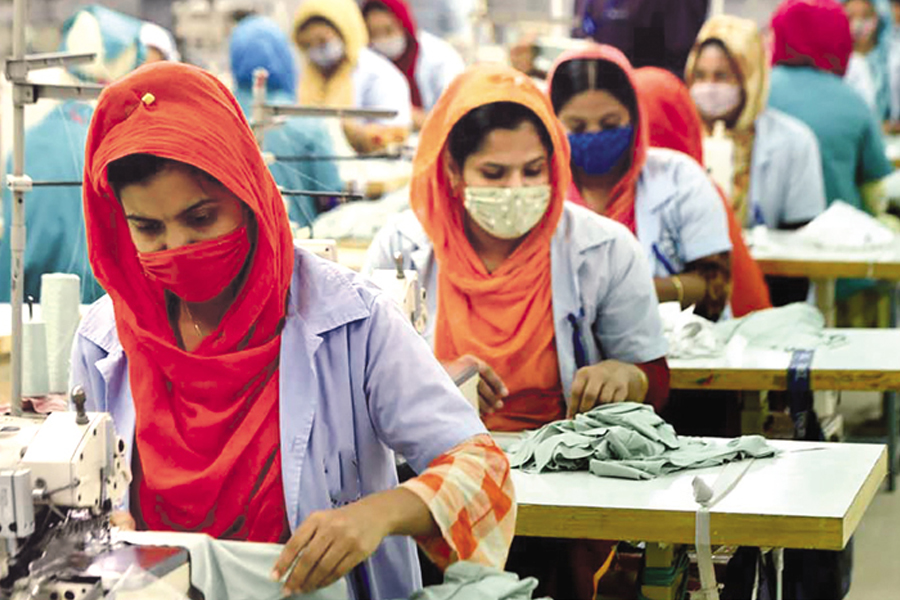Reducing the costs of just transition for Bangladesh's RMG workers

Nayma Akther Jahan and Haseeb Md. Irfanullah
Published :
Updated :

Climate change is no longer only an environmental phenomenon. It is now the greatest justice challenge of our time. Its worst impacts are suffered by those least responsible, especially low-paid workers in the Global South. In Bangladesh, the ready-made garment (RMG) sector is home to over 4 million workers, of whom over half are female. These workers find themselves caught between the double forces of climate change and economic transformation, with rising health risks and job insecurity in the face of a global shift towards a low-carbon economy.
In countries like Bangladesh, where the majority of RMG employees work in informal or semi-formal environments, they are especially vulnerable due to the absence of safety nets like healthcare or unemployment insurance. Decarbonisation is necessary to prevent a global disaster. But if it is not planned fairly, it may have negative economic effects. As a recent study by the Ethical Trading Initiative (ETI) showed migration, mental health crises, and child labour have all grown as a result of poorly managed transitions in various contexts. As a high energy consumer, the RMG sector must be part of the solution. However, despite allocating Tk 43,000 crores for environment and climate programs in FY 2025-26, most funds go to infrastructure and adaptation, not worker resilience or green industrial transformation.
A just transition is not only an economic plan, but also a moral requirement. According to the ILO's Just Transition guidelines, if early and inclusive investments are made, the green transition could provide over 24 million jobs worldwide by 2030. Inaction might have disastrous consequences for the county's RMG sector such as lost money, decreased productivity, and a growing gender poverty gap . The RMG industry is making encouraging strides, as seen by the 229 factories that have obtained worldwide green building certifications. However, social fairness and environmental benefits must coexist. For a just transition Bangladesh needs to implement policies that safeguard workers' rights, earnings, and well-being while guaranteeing a sustainable economic future in order to fulfill its climate obligations.
Against this backdrop, to ensure a worker-friendly and inclusive transition, Bangladesh must take four feasible actions.
1. Enhance climate literacy and workers' rights: Government departments, trade unions, and NGOs must collaborate on factory-focused campaign programmes to create advocacy for climate hazards. Information about heat stress, occupational illness, and their rights under the law must be available to workers in understandable language. The programmes must be integrated with the National Adaptation Plan of Bangladesh (NAP, 2023-2050), which already focuses on community-based resilience. As the RMG sector transforms to green production, employees ought to be provided with new skills. Public-private initiatives, such as the Skills for Employment Investment Programme (SEIP), need to be expanded to fields of energy efficiency, circular production, sustainable materials, and waste reduction.
2. Improve workplace health and safety standards: Extreme heat must be officially classified as an occupational hazard in the labour regulations. Regulation reform must impose a minimum set of protections-ventilation equipment, shaded rest areas, emergency medical care, and cooling shelters. The department of inspection of factories and establishments( DIFE) needs a bigger workforce and more robust digital monitoring equipment, and local clinics must be equipped to treat illnesses and injuries related to climate as also recognised in the ILO Guidelines .
3. Mobilise climate finance for factories: Small and medium-sized enterprises in the RMG sector, all of which operate in an informal structure, have limited resources to invest in green technology. A Green Transition Fund under the Bangladesh Climate Change Trust Fund (BCCTF) must be established that provides soft loans, tax benefits, and technical support. As envisaged in Bangladesh NAP, partnership with the global Green Climate Fund (GCF) and development financial institutions will unlock concessional finance and knowledge sharing.
4. Enact fair purchasing practices by global brands: Global brands demand carbon-neutral supply chains, but aren't willing to pay for the transition. Bangladesh must push for enforceable agreements that force brands to pay for the sustainability cost. Equally, while the 2021 International Accord made fire and building safety everyone's business, a new Climate Accord must make green supply chains mean no job cuts or wage repression.
These recommendations align with the current national priorities, our Nationally Determined Contributions (NDC), the NAP, and the expressed focus of the 2025-26 budget on climate resilience. However, institutional coordination, and worker-focused approaches to climate governance are lacking. There is the need to accommodate all these in an inclusive package.
Nayma Akther Jahan is a Lecturer & Research Associate, and Dr. Haseeb Md. Irfanullah is a Visiting Research Fellow of the Center for Sustainable Development (CSD) at the University of Liberal Arts Bangladesh (ULAB), Dhaka.
nayma.akther@ulab.edu.bd; haseeb.irfanullah@ulab.edu.bd


 For all latest news, follow The Financial Express Google News channel.
For all latest news, follow The Financial Express Google News channel.